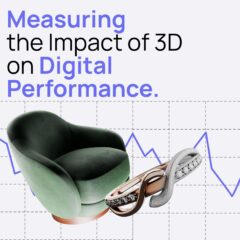The world of e-commerce is evolving faster than ever. As competition heats up and consumer expectations rise, businesses are increasingly turning to cutting-edge technologies like 3D modeling and artificial intelligence (AI) to stand out. Together, these tools are not just enhancing the shopping experience — they’re reshaping the entire digital retail landscape.
In this blog post, we explore how 3D and AI are driving the future of e-commerce and why brands that embrace them today will lead tomorrow.
3D Product Visualization: Try Before You Buy
Gone are the days of flat, static product photos. With 3D technology, customers can now interact with products in a much more immersive way:
- 360-Degree Views: Shoppers can rotate, zoom, and inspect products from every angle.
- Augmented Reality (AR): Using a smartphone camera, customers can virtually place furniture in their homes or try on accessories — all before making a purchase.
- Customization: Want to see a sofa in blue velvet or a sneaker with neon green laces? 3D configurators let users personalize products in real-time.
Impact for brands: Reduced return rates, increased buyer confidence, and higher conversion rates.
AI-Powered Personalization: Tailoring Every Experience
Artificial intelligence is at the heart of personalized e-commerce experiences. From the moment a customer visits a site, AI starts working in the background to understand their preferences and behaviors:
- Product Recommendations: AI algorithms analyze browsing history, purchase behavior, and even social media signals to suggest products you’re more likely to love.
- Smart Search: Natural language processing (NLP) allows users to type or even speak searches in their own words — “shoes for rainy weather” — and still get accurate results.
- Dynamic Pricing: AI can adjust prices based on demand, competitor pricing, and individual customer segments, maximizing both revenue and customer satisfaction.
Impact for brands: Personalized experiences lead to stronger engagement, higher average order values, and improved customer retention.
Virtual Try-Ons: Bridging the Gap Between Online and Offline
For industries like fashion, eyewear, and cosmetics, virtual try-on technology powered by AI and 3D is a game-changer:
Face and Body Mapping: AI uses your device’s camera to map your facial features or body shape, overlaying products like glasses, makeup, or clothing in real time.
Fit Prediction: AI analyzes body measurements and past purchases to recommend the right size and fit — reducing sizing-related returns.
Impact for brands: Customers feel more confident in their purchases, boosting trust and loyalty.
AI in Customer Support: Smarter, Faster, 24/7
E-commerce support is becoming increasingly AI-driven:
- Chatbots & Virtual Assistants: Available 24/7, AI chatbots can handle everything from product queries to returns and order tracking.
- Sentiment Analysis: AI tools can detect customer emotions in written feedback and reviews, allowing brands to proactively address issues.
Impact for brands: Enhanced customer experience, reduced workload for human agents, and faster resolution times.
Smarter Inventory and Supply Chain Management
AI isn’t just transforming the front-end experience — it’s revolutionizing backend operations as well:
- Demand Forecasting: AI can predict sales trends based on historical data, weather, social media buzz, and more.
- Inventory Optimization: Retailers can automate stock replenishment and avoid overstocking or understocking.
Impact for brands: Lower operational costs, fewer out-of-stock situations, and a more agile supply chain.
Why This Matters Now
Consumer expectations have changed. Shoppers want experiences that are:
- Immersive
- Instant
- Intuitive
Technologies like 3D and AI offer e-commerce businesses the tools to meet (and exceed) these expectations. The brands that adopt these innovations aren’t just keeping up — they’re setting the pace for the future of retail.
3D and AI are not just trends — they’re long-term shifts in how e-commerce operates. Together, they’re creating a more personalized, immersive, and efficient shopping experience for customers while giving businesses the insights and tools they need to thrive.
If you’re in e-commerce, now is the time to explore how these technologies can work for you. Because in the world of online retail, the future isn’t coming — it’s already here.





